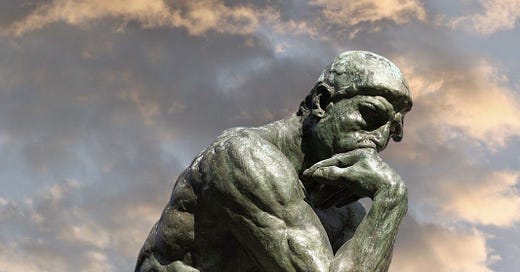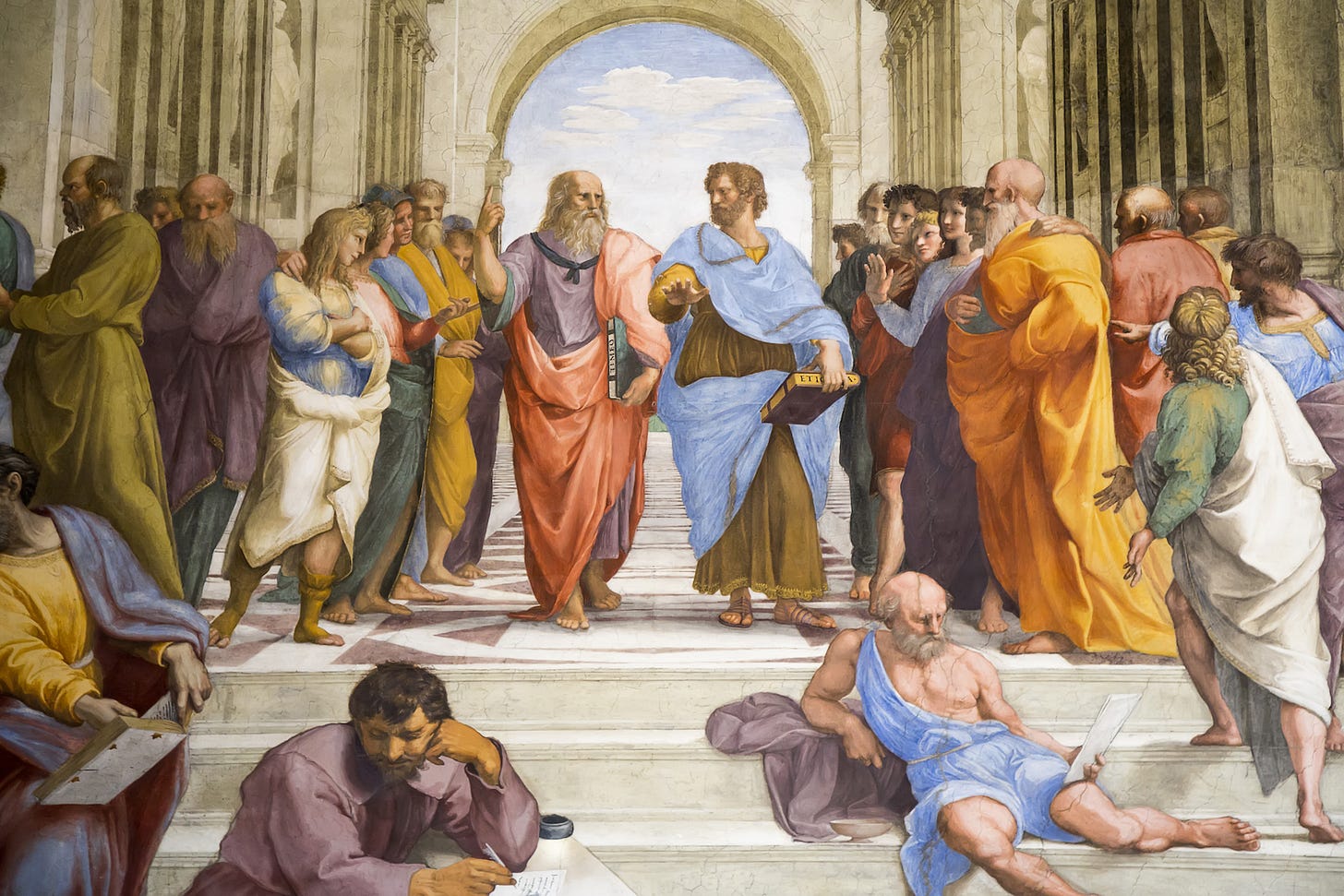We produce nothing if not academic papers. There are millions of academics in the world, and every year, they publish millions of articles.[1] Some of the new work is good, and some – very good. Yet, it is difficult to point to anyone after Einstein who has done something outstanding, something likely to be remembered for centuries. I am not the first to observe that our time can boast no Darwins, Newtons, or Galileos. It is as though humanity, somehow and for some reason, can no longer birth great minds. But why? Did our talent well run dry?
It may be supposed that in lamenting the current state of affairs, we compare, unfairly, the output of the last several decades to that of the rest of history. If you pick at random a past seventy-year period and look at who the important thinkers then were, chances are you won’t find anyone you have already heard of. Why should the last seventy years be any different?
My answer is that the relevant comparison is not between achievements produced over periods of equal duration but between achievements produced by equal numbers of scientists and other thinkers. While human history goes back centuries, according to current estimates, ninety percent of all scientists who ever lived are alive today.[2] That all the great ones may come from the ranks of the deceased ten percent calls for an explanation.
Perhaps, the answer is that greatness is staring us in the face, and we don’t see it. Or we refuse to see it. Marcel Proust suggested once that we are loath to call living people “great.” The reason he gave was cynical, but one that rings at least partially true: We don’t envy the dead, and it is easier to put on a pedestal those you don’t envy. I would add that the dead are not competition for awards and recognition.
There may, also, be a legend-like aspect to the idea of greatness, and legends require exaggeration and idealization unlikely to survive a reality check. Death helps mythmaking, here and elsewhere.
But some people in the past became living legends (think of Einstein), and at any rate, many scientists have passed away in the last several decades, yet it is difficult to think of someone who joined humanity’s Great Hall of Fame during that period.
Let’s consider an alternative explanation of what seems like an intellectual giants drought, an explanation which has to do not with envy but with desire for amusement. It is possible that our attention span has become too short for anyone’s rise to prominence to endure. We may not want to spend much time on a serious author either. That’s a problem, because greatness status cannot be attained in a single day. Thinkers from the distant past benefit from having had generations of less distractable people study their works. How well would the great of old fare if they came back to life?
That’s a fair question. Interestingly, Robert Musil, in his remarkable 1930s novel The Man Without Qualities, suggested that distractibility and desire for novelty would have made it impossible for people in his day and age to pay attention to Plato for more than a short period of time. If Plato walked into an editor’s office today, Musil writes, he would become an overnight sensation and receive multiple lucrative offers from news outlets. Perhaps, one of his older works would be turned into a film. But the shiny new thing would lose its luster before long, even if that thing happens to be Plato. Musil writes:
“The moment his return had ceased to be news, however, and Mr. Plato tried to put into practice one of his well-known ideas, which had never quite come into their own, the editor in chief would ask him to submit only a nice little column on the subject now and then for the Life and Leisure section (but in the easiest and most lively style possible, not heavy: remember the readers), and the features editor would add that he was sorry, but he could use such a contribution only once a month or so, because there were so many other good writers to be considered.”
This prescient passage may capture the spirit of our time better than it captured Musil’s own. Yet, I can’t help but think that Plato would continue to be seen as great if he came back now. His return would just, inevitably, cease to be news.
Another possibility is sometimes suggested: progress has become too difficult. The low-hanging fruit has been picked, and the remaining puzzles outmatch human cognitive capacities.
But I don’t find this hypothesis compelling either, though there is something to it. Whatever is known tends to seem easier to discover than that which is not yet known. Would any one person living today have come up with Newton’s Laws of Motion? With Darwin’s theory of evolution? It is not clear.
What then?
I wish to suggest that we simply work differently from people in the past, and our modus operandi militates against individual greatness. We live in an age of collective incrementalism. We absorb -- and often thoroughly – the preceding tradition. As a consequence, the work we produce lacks the independence of thought and the unity that continue to impress us in Newton’s and Darwin’s work centuries later.
In addition, we collaborate. There are hundreds of people working together with particle accelerators, brain tissues, on large language models, or who jointly carry out experiments (and who team up with other groups running closely related experiments). Together, we could have come up with the laws of motion or the theory of evolution. It is just that no one is likely to have done it singlehandedly. If there are no lone geniuses, this is likely because no one is working alone.
But work is getting done. I suspect that while future generations may not know the names and legacies of anyone living today, the achievements of our time will attain intellectual immortality, just in a different way. Since new developments are likely to continue to absorb the preceding tradition, the future will contain the present. Our ideas will survive in the work of our descendants, but they will lose their contours. Future people will turn them into fertilizer for their own thoughts.
Why would we want individual great minds anyhow? Perhaps, we need to change the human psychological propensity to romanticize the idea of the lone genius (to which the Nobel prize committee caters, insisting on giving the prize to individual scientists, not teams). Or maybe, we can keep the idea but put it in its proper place. It is, after all, a trope that works well in certain kinds of fiction. We like legends and heroes. We just shouldn’t expect life to resemble a movie script.
I suspect, however, that when lamenting the perceived lack of great minds, we wish not simply for more intellectual giants but for more breakthroughs. We may relinquish the idea of the lone genius – or put it, as I suggest, in its place – but we cannot give up our desire for progress. And nor should we. What of that?
I note in response that the incrementalism of today is actually taking us farther faster than individual greatness would. There was hardly ever a time in human history when so much headway took place in a few decades as in the last few. The world we live in is vastly more advanced than the pre-internet world of my early childhood. (Ray Kurzweil went so far as to suggest that knowledge production doubles every 12 hours.) One may, thus, invert the initial question and ask: How are we making progress so quickly if no one does anything outstanding? And the answer appears to be that a myriad of small steps count for more than a few big leaps. It is a bit as though instead of intellectual giants, we have something reminiscent of the sight gag involving three kids in a trench coat stacked on top of each other. What’s remarkable is that the trio advances more rapidly than the one tall adult. (Stephen J. Gould in Full House: The Spread of Excellence from Plato to Darwin argues, relatedly, that while no baseball player today has Babe Ruth’s batting average, the league’s average is no worse, because the median player today is better than the median player in Babe Ruth’s time. What goes for baseball players may go for scientists.)
Still, some worry that progress has recently begun to slow down. This is the final point I wish to address. If the observation is true, don’t we, after all, need some more geniuses?
I will make two points in response. First, collective incrementalism creates a situation in which breakthroughs may be getting undercounted, because they don’t look like breakthroughs: they don’t happen all at once. Each begins as a 1.0 version and takes multiple attempts, so no new achievement goes very much farther than the preceding ones.
Second, even if the rate of breakthroughs is slowing down, it is at best unclear that what we need in order to accelerate progress is more individual great minds. Perhaps, what we need, instead, is better incrementalism and a better incentive structure for scientists, one that creates conditions which favor bigger leaps forward. Working on those conditions may be our best bet. It may also be our only bet since it is at best unclear how we may possibly go about creating the next Newton.
But that bet is good enough. This is my final thought. There are great achievements without outstanding achievers; achievements behind which stand multiple people that are simply pretty darn good.
[1] https://www.science.org/content/article/scienceadviser-scientists-are-publishing-too-many-papers-and-s-bad-science
[2] https://futureoflife.org/guest-post/90-of-all-the-scientists-that-ever-lived-are-alive-today/.







I wonder whether the phenomenon you describe isn't partly due to its having become a lot easier to convert brains to dollars. Presumably being smart has always been an advantage relative to the goal of acquiring wealth, but prior to the 1950s, what were the most intellectually demanding high-paying jobs? I'm thinking civil engineering, mechanical engineering, actuarial statistics, and the management of very large and complex organizations (like militaries and big banks). No doubt there are others I'm missing, but it seems pretty clear that these days, there are a lot more high-paying jobs that require a really good brain than there were 70 years ago: just think of the commercial demand for data analysts, software developers, and biomedical researchers. Maybe the would-have-been Einsteins, Turings, and Darwins are getting scooped up by Google and Genentech, where they're too busy getting rich to make epoch-making discoveries.
As you say, perhaps greatness is staring us in the face, and we don't see it. Or we refuse to see it, status quo bias being extremely powerful. I would like to submit a candidate for greatness, a modern Isaac Newton: Andrew J. Galambos (1924-1997). Galambos left his job as a working astrophysicist to found the Free Enterprise Institute, where he created courses and lectured from 1961 until the mid 1980s when ill health prevented him from continuing. Central to his teaching was what he called the theory of volition. His associates came up with the name "volitional science," and it stuck. In his basic course, catalog number V-50, he said, "In this Course there is an integration of Volitional Science comparable to and intellectually derivable from and dependent upon Isaac Newton's integration of physical science..." What he was saying was that he had done for social science what Newton did for physical science. A bold claim, and one he seldom repeated. As his student for five years, I believe he was right. Sadly, he didn't publish much, but a well-edited transcript of several of his lectures has been published, titled Sic Itur Ad Astra.